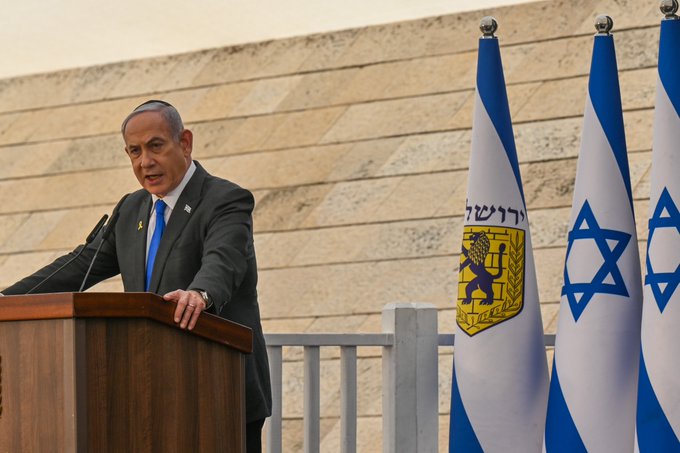Israel’s prime minister has called on the Lebanese people to remove Hezbollah from power to prevent “destruction and suffering similar to what is happening in Gaza.”
Benjamin Netanyahu made this appeal on Tuesday as Israel intensified its invasion of Hezbollah by deploying thousands more troops into a new zone in southwestern Lebanon. The Israeli military reported that 50 Hezbollah members were killed in airstrikes on Monday.
According to Lebanon’s health ministry, 36 people were killed and 150 injured in Israeli attacks over the past 24 hours.
Meanwhile, Hezbollah continued its rocket attacks, targeting the Israeli port of Haifa for the third consecutive day, injuring 12 people.
During a video address directed at the people of Lebanon, Netanyahu said: “You have an opportunity to save Lebanon before it falls into the abyss of a long war that will lead to destruction and suffering like we see in Gaza.
“I say to you, the people of Lebanon: Free your country from Hezbollah so that this war can end.”
Netanyahu also claimed that the Israel Defense Forces (IDF) had killed the successor to Hezbollah’s former leader, Hassan Nasrallah, but the IDF later stated it could not confirm the death of Hashem Safieddine.
Despite weeks of intense Israeli airstrikes and other attacks, Hezbollah has remained defiant, with Lebanese officials reporting over 1,400 deaths and the displacement of 1.2 million people.
Earlier on Tuesday, Naim Qassem, former deputy to Nasrallah, asserted that Hezbollah had weathered Israel’s “painful blows” and maintained that its capabilities were still intact.
Israel has launched its offensive after nearly a year of cross-border fighting, sparked by the Gaza war, with the aim of securing the return of tens of thousands of Israeli border residents displaced by Hezbollah’s rocket, missile, and drone attacks.
The conflict has escalated since Hezbollah began firing rockets into northern Israel on October 8, 2023, in support of Palestinians, following Hamas’s attack on southern Israel.
On Tuesday morning, the IDF announced that reservists from its 146th Division had initiated “limited, localized, targeted operational activities” in southwestern Lebanon. This force joined three other divisions already operating in southern Lebanon since the invasion began on September 30, with the total number of soldiers now reportedly exceeding 15,000.
The IDF claimed its troops had taken control of a Hezbollah “combat compound” in Maroun al-Ras and released photos showing a rocket launcher and weapons inside a residential building. Drone footage also revealed widespread destruction in the nearby village of Yaroun, a primary target of the invasion.
Meanwhile, the UN special co-ordinator for Lebanon and the head of the UN peacekeeping force issued a joint statement warning that the humanitarian impact of the conflict was “nothing short of catastrophic.”
Lebanon’s government reports that 1.2 million people have fled their homes, with 180,000 sheltering in displacement centers and over 400,000, including 200,000 Syrian refugees, fleeing into war-torn Syria—a situation described by the UN refugee agency as a “tragic absurdity.”
The World Food Programme raised alarms over Lebanon’s ability to sustain itself, as thousands of hectares of farmland have been destroyed or abandoned.
The IDF also launched new airstrikes on Hezbollah targets in Beirut’s southern suburbs and other areas in Lebanon on Tuesday. A Monday strike in the capital reportedly killed Hezbollah commander Suhail Husseini, though the group did not comment on the claim.
If confirmed, it would mark another severe blow to Hezbollah, following the recent deaths of Nasrallah and many of the group’s senior military commanders in Israeli strikes. Hashem Safieddine, a prominent Hezbollah official and Nasrallah’s cousin, has not been heard from since an Israeli airstrike reportedly targeted him in Beirut last Thursday.
IDF spokesperson Daniel Hagari said on Tuesday that the military could not confirm Netanyahu’s claim that Safieddine was killed, noting that the IDF is still assessing the results of the operation.
Hezbollah’s deputy leader said in a defiant televised address from an undisclosed location on Tuesday that its command and control was “solid” and had “no vacant positions”, citing its attacks on Israel in recent days.
“We are hurting them and we will prolong the time. Dozens of cities are within range of the resistance’s missiles. We assure you that our capabilities are fine,” Naim Qassem said.
But, for the first time, he made no mention of ending the war in Gaza as a pre-condition where previously Hezbollah has said it would not stop attacking Israel until the Gaza conflict is over.
“We support the political efforts that (Lebanese Parliament Speaker) Nabih Berri is undertaking towards a ceasefire,” Qassem said in a televised speech.
“Once a ceasefire is achieved, diplomacy can look into all the other details.”
It was unclear whether this signaled a shift in Hezbollah’s stance.
The speech coincided with the launch of over 100 rockets targeting Haifa Bay, along with the Lower, Central, and Upper Galilee regions.
According to the IDF, most of the rockets were intercepted, and there were no serious casualties.
However, on Sunday night, Haifa experienced a direct hit, marking the first such incident since the 2006 war between Israel and Hezbollah.


